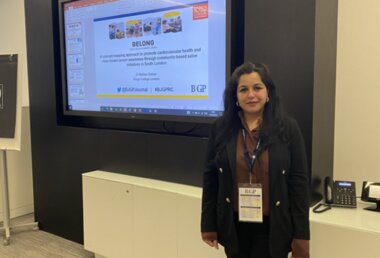7 June 2023
Maham Zaman works as a research assistant on the BELONG study and separate to her work on BELONG is also completing a PhD with King’s College Business School. She is also now a winner of the British Journal of General Practice’s early career research award.
KHP’s Tasneem Ali spoke to Maham to find out more about the work she does and how it felt to win this excellent award.
How did you feel being awarded an early career research award by the British Journal of General Practice (BJGP)?
The award announcement was made at the BJGP’s Research Conference where I had given a presentation early on in the day. I was unable to attend the award presentation but Aya – a colleague who attended the conference with me - sent me an email saying “you won the award and they called out your name in front of everyone”. I thought this cannot be me – I won the award? There were such fantastic presentations that day and some very experienced people so I was very honoured that they chose me.
Can you tell me us more about what the award is in recognition of?
Our project is called the BELONG study - BELONG is an acronym for beauty and health community lounges. This study looks to address health inequalities and health care access in the UK and we intend to work with women from ethnically diverse communities. Similar studies to raise awareness for prostatic cancer in barber shops have been run in the United States before and they have proven very successful. London is very diverse, with people from all backgrounds and walks of life. The BELONG team wanted to use the social capital of hairdressers and beauty therapists to help people in their communities.
For the study we spoke to beauticians and hairdressers about raising awareness for cardiovascular risk factors and breast cancer because these are two of the leading causes of morbidity and mortality in ethnically diverse women in the UK. We wanted to give them information which they could talk to their clients about. In the salon it’s like a magic chair effect - you tend to spill out your life’s secrets, it's something about that chair. Also, you can sit in that chair for two hours getting your hair or makeup done. So, we identified this as a great opportunity to try and raise awareness.
Why do you think the BELONG Study is important?
Social capitals like hairdressers, beauty salons, shopkeepers, they have very strong community bonds. They can talk about these things to people and I can bet you it makes more sense to them as opposed to you and me talking about it. If I go to a Indian or a Pakistani salon, I will make more sense to them because obviously I can speak in my native language and they can relate to me so this is what we're trying to utilise. Even if one person after listening to a health promotion message, contacts the screening service and we save a life, I think that is BELONG right there.
What was it like working in partnership with the beauty and health lounges?
I was in one of the participating beauty salons about two weeks ago, and the therapist knew everyone on the street. As women passed the door of her salon she could tell me, their names, how many children they had, where they lived, how many times they’d been to the salon. She said everyone comes in, even if it's just to say hello.
We were discussing BELONG and a couple of clients came in, she introduced me and said “this is a researcher from King’s College London, she's working on breast cancer awareness”. Immediately the clients were so interested they spent an hour telling me how many women in their family had been diagnosed with breast cancer and how their families had suffered. It made me realise how strong the community connections are and they work as opposed to someone sitting in a chair in a surgery telling them you need to get this done.
What are your hopes for the future with regards to this research?
Hopefully BELONG is successful and next we will be able to disseminate it to the wider population. We are targeting women from deprived and ethnically diverse communities in London for now and if this works we intend to expand it to even more salons. Maybe we can go further across the UK to other cities; I know from a lot of people from elsewhere in the UK would be very keen on working with us.
What is one lesson that you've learned through this research?
If I were to do it again, I would believe more in that community connection because it's amazing. It's so beautiful when you get to experience it, and the way that these people trust each other and want to do something for each other, it gives me a lot of hope!
Want to hear more about innovative approaches to raising cancer awareness through community-based salons and barber shops? Join the Primary Care Webinar on 5 July at 1pm Eventbrite page.





